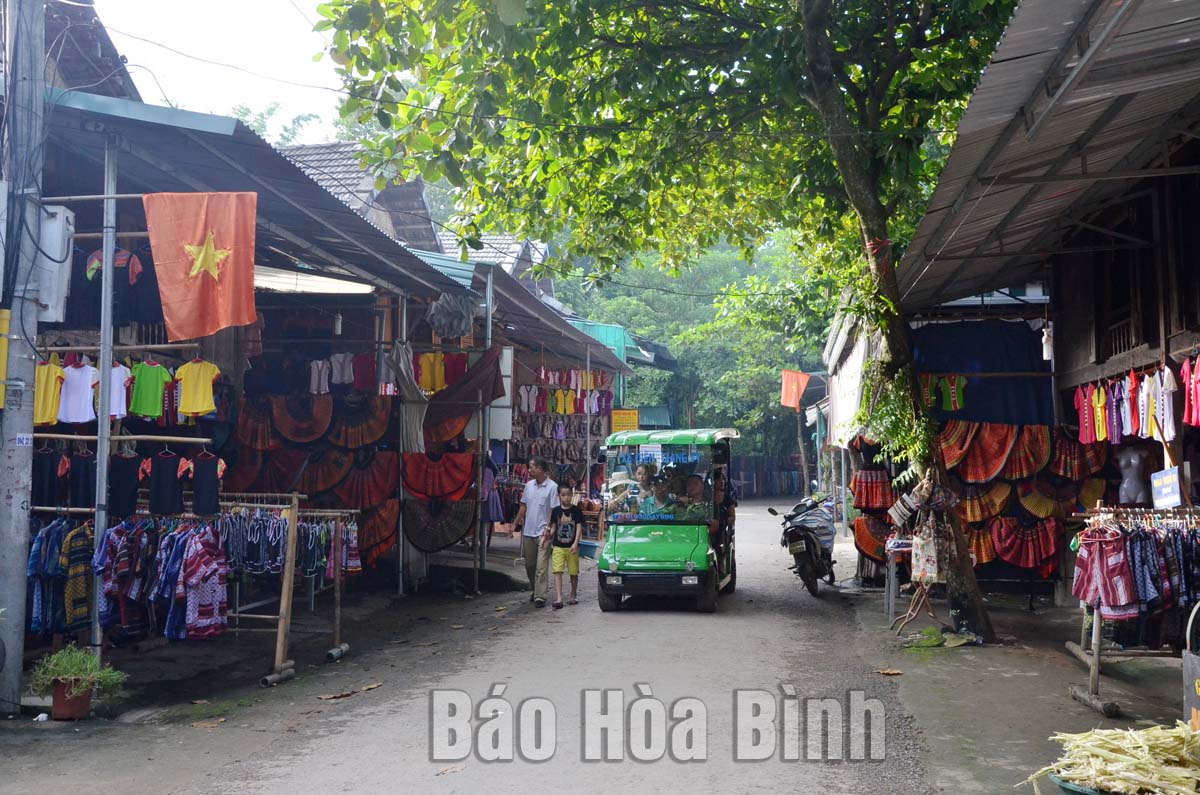
(HBO) – Whenever possible, the two Lao women adopted by Luong Son Toan, a resident in Chieng Sai hamlet of Mai Chau township (Mai Chau district), amid numerous hardships in the past return to Mai Chau to visit their beloved Vietnamese family.

Lac hamlet in Chieng Chau communes (Mai Chau district)
witnesses touching stories about the Vietnam - Laos relations as it was where
some children from the other side of the border were brought up.
Borderless
ties
Poet Lo Cao Nhum, a resident in Lac hamlet of
Chieng Chau commune who witnessed this touching story, said in the years full of
difficulties and hardships, the family of Luong Son Toan in Chieng Sai hamlet
still adopted two orphaned girls of the Lao nationality and helped them go to
school. Living up to their adoptive parents’ expectations, the daughters passed
examinations to enroll in the Tay Bac (Northwest) College for Culture and Arts
and then became artists of the Lao army’s art troupe.
Nhum said they have returned to visit their
adoptive parents for many times.
Kha Van Nhut, Secretary of the Party Committee
of Na Phon commune, said in the 1960s, the Party Committee and People’s
Committee of Mai Chau district evacuated to Nhot hamlet, where local residents
welcomed and guaranteed absolute safety for a meeting between First Secretary
of the Communist Party of Vietnam Central Committee Le Duan and President of
Laos Souphanouvong. After that important event, Mai Chau people frequently held
the responsibility for protecting President Souphanouvong and many other senior
officials of Laos during their movement along the historic Road 15.
Further
strengthening friendship, solidarity
In the resistance war against French
colonialists, due to Mai Chau’s strategic location, people of all ethnic groups
here not only engaged in the fight and delivered support to Vietnamese soldiers
in the northwestern battlefield, but also enthusiastically assisted their
compatriots in Hoa Binh province and nationwide to perform the noble
international mission of helping the Lao revolution in the struggle against the
common enemy, according to former Secretary of the Mai Chau district Party
Committee Kha Phuc Giang.
In addition, after setting up a logistics base
in Mai Chau, the Pathet Lao armed propaganda team came to Vietnam to coordinate
with Vietnam’s military units to establish a Vietnam - Laos joint armed
propaganda team. Within two months, this team worked actively in the two
countries’ border areas and along the Ma River, leaving strong impression on
local residents.
During the resistance war against the US, Mai
Chau also witnessed evidence of the Vietnam - Laos friendship when it was a
transit point for goods, foods, ammunition, and medicine from Hai Phong Port to
Sam Neua town of Laos. Along Road 15 from Suoi Rut to Van Mai, many places were
used to store weapons and vehicles of the Lao army. In particular, Mai Chau
also accommodated a school for training Lao cadres during this period.
Upholding that precious tradition, after the
war, the district sent many of its experienced personnel to assist the
localities facing difficulties in Laos.
Ha Cong Nghi, Standing Vice Secretary of the Mai
Chau district Party Committee, said nowadays, though there haven’t been many
economic activities between Mai Chau and Viengxay and Sop Bao districts of
Laos’ Houaphanh province, the two sides have still organised frequent meetings
and cultural exchanges to help intensify the faithful and close-knit ties
between Vietnam and Laos./.
Nestled in the northwest, Hoa Binh province stands as a strategic gateway, connecting the bustling capital of Hanoi with the Red River Delta, north central and northeastern regions. Its unique location also links it to Upper Laos, making it a pivotal area for trade and cultural exchange.
The 17th-tenure Hoa Binh provincial Party Committee recently convened its 20th meeting. The session was chaired by Nguyen Phi Long, alternate member of the Party Central Committee and Secretary of the provincial Party Committee; Bui Thi Minh, Standing Deputy Secretary of the provincial Party Committee and Chairwoman of the provincial People's Council; and Bui Duc Hinh, Deputy Secretary of the provincial Party Committee and Chairman of the provincial People’s Committee. Also in attendance were other members of the provincial Party Committee and leaders of several provincial departments and agencies.
A delegation of the Indian Embassy in Vietnam led by Ambasador Sandeep Arya paid a working trip to Hoa Binh province on April 1, aiming to explore cooperation opportunities. The delegation was received by Nguyen Phi Long, alternate member of the Party Central Committee and Secretary of the Hoa Binh provincial Party Committee, along with Nguyen Van Chuong, Vice Chairman of the provincial People’s Committee, and representatives from various departments and agencies.
A delegation from the Standing Board of the Hoa Binh provincial Party Committee led by Nguyen Phi Long, an alternate member of the Party Central Committee and Secretary of the provincial Party Committee, on March 20 inspected the progress of the Hoa Binh - Moc Chau expressway project in Mai Chau district.
The Steering Committee for the Development of Science, Technology, Innovation, and Digital Transformation of Hoa Binh province convened a meeting on March 11 to deploy key tasks.
Lac Son district is reorganising and streamlining its organisational apparatus and the contingent of officials, civil servants and public employees in line with Resolution 18 issued by the 12th Party Central Committee.



